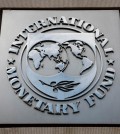- California Assembly OKs highest minimum wage in nation
- S. Korea unveils first graphic cigarette warnings
- US joins with South Korea, Japan in bid to deter North Korea
- LPGA golfer Chun In-gee finally back in action
- S. Korea won’t be top seed in final World Cup qualification round
- US men’s soccer misses 2nd straight Olympics
- US back on track in qualifying with 4-0 win over Guatemala
- High-intensity workout injuries spawn cottage industry
- CDC expands range of Zika mosquitoes into parts of Northeast
- Who knew? ‘The Walking Dead’ is helping families connect
U.S. calls deepening N.K.-Russia ties trend of ‘great concern’ ahead of Putin’s Pyongyang visit
A U.S. State Department spokesperson on Monday described deepening military cooperation between North Korea and Russia as a trend of “great concern,” after the North said Russian President Vladimir Putin will visit Pyongyang this week.
The North’s Korean Central News Agency announced Putin’s plan to pay a state visit to Pyongyang from Tuesday to Wednesday amid concerns that he and North Korean leader Kim Jong-un will seek to cement the bilateral military partnership with security implications on the Korean Peninsula and beyond.
“We are aware of reports that President Putin will visit Pyongyang soon,” the spokesperson said in response to a question from Yonhap News Agency.
“Deepening military cooperation between Russia and the DPRK is a trend that should be of great concern to anyone interested in maintaining peace and stability on the Korean Peninsula, upholding the global non-proliferation regime, and supporting the people of Ukraine as they defend their freedom and independence against Russia’s brutal invasion,” the official added.
DPRK stands for the North’s official name, the Democratic People’s Republic of Korea.
Putin’s visit to the North would mark his first trip to the North in 24 years. He last visited the reclusive country in July 2000, when Kim Jong-un’s late father, Kim Jong-il, was in power.
Seoul, Washington and other countries have carefully watched developments in bilateral military ties between Pyongyang and Moscow due to their broad security implications.
Washington has revealed that Pyongyang has shipped over 10,000 containers of munitions or munition-related materials to Russia since September, in addition to its missile shipments.
In return, the North has been seeking assistance from Moscow, including fighter aircraft, surface-to-air missiles, armored vehicles and ballistic missile production equipment, according to U.S. officials.











